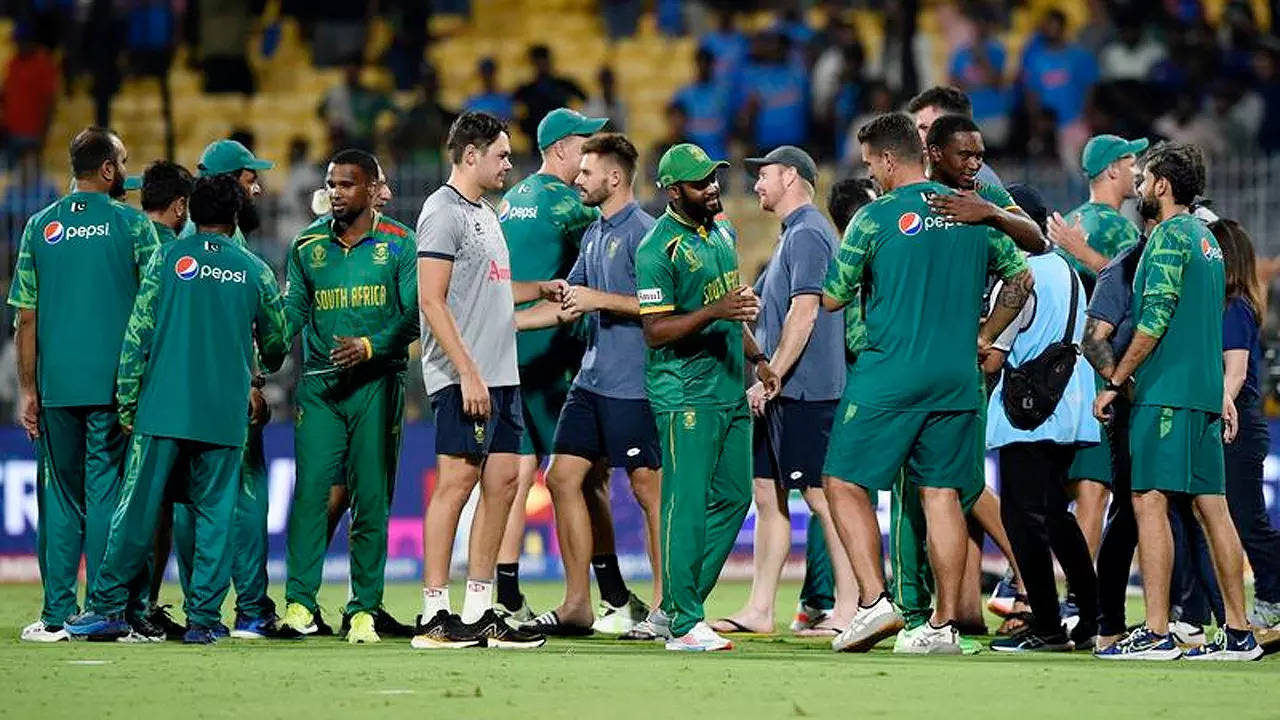
CHENNAI: Be it a dropped catch and a bizarre run-out in the 1999 World Cup or goofing up a Duckworth Lewis target in 2003, great South African teams have always manufactured methods to throw away winning positions. Their last such choke was in 2015, when again a great South African team led by AB de Villiers allowed New Zealand's Grant Elliot to rise from anonymity in the semifinal and become a World Cup hero.
This time around, while the Proteas have steamrolled teams batting first, their nerve-wracking one-wicket win against Pakistan on Friday might give the impression that they have outgrown the choker's tag. But have they really?
Let's go back to the Friday thriller. There were instances when South Africa needed about 130 runs in 25 overs when Aiden Markram tried to slog leggie Usama Mir and a couple of edges fell in no-man's land. The vice-captain buckled down and played brilliantly and then as South Africa needed 21 off 10, he committed the mistake of repeating the shot to gift his wicket away. That opened the door for Pakistan and the famous South Africa choke was just round the corner. It was Proteas' luck that No. 11 Tabraiz Shamsi wasn't given leg-before which somehow helped them cross the finishing line against a Pakistan running on reserve.
While the relief was palpable, there was also the sense of concern in the South African ranks that nothing much has changed.
Captain Temba Bavuma conceded South Africa had luck on their side. "I do think we could have shown up a lot more of a clinical display in going about that run chase. We did have luck on our side, but we gave them opportunities to get into the game," Bavuma was brutally honest about a botched-up chase that finally resulted in the win.

1/10:World Cup: South Africa break Pakistan hearts with one-wicket win
PTI
2/10:South Africa edge past Pakistan
Aiden Markram's 91 guided South Africa to a one-wicket win against Pakistan.AP
3/10:Last pair heroics for South Africa
Keshav Maharaj and Tabraiz Shamsi scored the winning runs to seal a dramatic win for South Africa.PTI
4/10:Aiden Markram shines for South Africa
Aiden Markram's solid innings of 91 set the foundation for South Africa's successful chase.AFP
5/10:Pakistan's semis hopes in jeopardy
Pakistan's fourth consecutive loss put their chances of reaching the World Cup semi-finals in doubt.AP
6/10:South Africa top the points table
South Africa's win took them to the top of the World Cup table with 10 points from five wins.IANS
7/10:South Africa survive late jitters
South Africa managed to hold off Pakistan's late surge to secure a thrilling victory.Getty Images
8/10:Tabraiz Shamsi shines with four-for
Tabraiz Shamsi's impressive bowling figures of 4 for 60 restricted Pakistan to 270 all out.Reuters
9/10:Pakistan's Shakeel & Shadab provide resistance
Saud Shakeel and Shadab Khan's partnership of 84 runs lifted Pakistan's total after early setbacks.AFP
10/10:Maharaj and Shamsi hold their nerves
Keshav Maharaj and Tabraiz Shamsi kept their composure to guide South Africa to victory in a tense finish.APLet's not forget that this was coming after another terrible chase against The Netherlands, who have won their only game of the tournament against the South Africans.
A closer look at the South African approach will suggest that there is a reluctance among their middle-order batters to bide time when things start to get difficult in the middle-overs. It's probably not a problem in conditions prevalent in South Africa and Australia, where the ball doesn't stop and turn and batters can hit through the line. But in India, skilful spinners come into play on helpful tracks and the top gear batting in middle-overs doesn't always win matches. It needs the ability to rotate the strike and look for singles and twos, a skill that superb South African hitters in the middle-order sometimes lack.
"But at the end of the day, the guys who were in there, Keshav Maharaj and Shamsi, they did it for us. It's easier for us to have conversations now with regards to our run chase…Batting first, we have a blueprint but I can't say with conviction we have the blueprint while chasing. We obviously want to show a more clinical display with the bat," Bavuma added.
They need to do it fast because up next for the Proteas are New Zealand and India-two massive contenders for the title.








